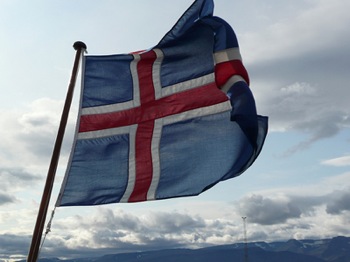 WALL STREET JOURNAL– For the second time, Icelanders voted down a deal to repay Britain and
the Netherlands billions of euros lost in the island nation’s 2008
financial collapse—at once a bold popular rejection of the notion that
taxpayers must bear the burden for bankers’ woes and a risky outcome
that will complicate Iceland’s efforts to rejoin global markets.
WALL STREET JOURNAL– For the second time, Icelanders voted down a deal to repay Britain and
the Netherlands billions of euros lost in the island nation’s 2008
financial collapse—at once a bold popular rejection of the notion that
taxpayers must bear the burden for bankers’ woes and a risky outcome
that will complicate Iceland’s efforts to rejoin global markets.
The money in question, about €4 billion ($5.8 billion), was placed by British and Dutch depositors in an Icelandic Internet bank called Icesave, and then lost when Icesave’s operator, Landsbanki Islands, collapsed along with the rest of Iceland’s big banks in October 2008.
Nearly 60% of 175,000 voters rejected a plan to compensate the British and the Dutch governments, who had stepped in to pay their own Icesave depositors when Iceland’s deposit-insurance scheme ran out of money.
The deal was the result of months of negotiation that saw Iceland win far better terms for the repayment. An earlier agreement was demolished—93% of voters said no—in a another referendum, in March 2010.
Read full article about Icelanders Rejecting Debt Repayment Plan.
© 2011 WALL STREET JOURNAL
Photo by flickr user Ezioman











As some have said here, politicians are not to be trust. Left, right cetenr all are the same; only obeying orders and looking after their own pockets and themselves. They try to frighten people by saying that if the case goes to court there are few changes to win and the conditions might get worst after that. However those are merely empty speculations based in no grounds. Anyway, should it be the case; if court rules in favor of Icesave, there is still an alternative as Jim mentioned, declare a payment moratorium. Argentina did it in 2001 and 2002; Kirchner opted to refuse payments in order to not increase poverty and instead the debt was renegotiated and payments duties were reduced in about 75%. Under that scheme Argentina’s economy had a firm growth of 7% during next decade and reduced the unemployment rate from 22% to less of 6%. Papandreu rejected to follow that example and instead went for reducing social benefits and salaries in about 20%, keeping bankers and all that elite untouched. The huge bailout for EU/IMF has been largely transfered bankers’s arch and transnational corporations. No investment in productive economy/infrastructure/education has been done to boost the economy in order to create new jobs and improve the harsh conditions people face day by day in Greece. This is just an example of how things are being carried out after corrupt politicians (all of them) surrender and hand over the sovereignty to fatal institutions like CEB and IMF. Ireland is another example, after a massive bailout the projections for its economy are very poor and a second boost might be needed just to survive. Social benefits are being hit in all fronts whereas corporations have kept their privileges and parasite bankers rewarded. In these two countries there were no referendums but brutal repression to opponents. Two examples who’s next? Portugal?, Spain?, Iceland should keep on track and raise their voice and pronounce against icesave. Not supporting either by voting in favor or by being apathetic. Greece and Ireland’s people would like to have a politician like President Ragnar Grimsson who understands the role of a honest politician; attend people’s needs and concerns and work for it. We are undergoing through turbulent time and periods of unrest everywhere, what direction will each country take will depend on how firm and how well organised people stay together pursuing a common cause. As Fisy said, politicians are a bunch of useless people so we can’t rely on them and the less expect something good from them; it is clear that they are defending other’s interests but no people’s. I insist, Iceland has a good change in reverting that wave that is sweeping everywhere undermining people’s basic rights of all nationalities leaving desperation and poverty behind. My best wishes for Icelandic people.